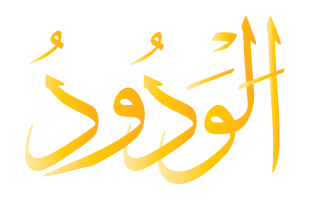AL-WADUD/AL-WADOOD MEANING - 99 NAMES OF ALLAH:
Al-Wadud / Al-Wadood
(The Most Loving)
Al-Wadud Meaning:
The Most Loving, The Most Affectionate, The Beloved.
Allah سُبْحَٰنَهُۥ وَتَعَٰلَىٰ is Al-Wadud (in Arabic: ٱلْوَدُودُ), the most loving and affectionate. He is faithful to his servants and shows them the purest love. He is the singular source of all love and kindness. The One who loves His believing servants, and His believing servants adore Him.

Mentions of Al-Wadud:
From Quran & Hadith
Arabic Root:
From the root waw-dal-dal (و د د), which has the following classical Arabic connotations: to love, to be affectionate, to long for, to desire, to wish for. The one who should be loved and whose friendship is to be earned.
In Arabic, love is written as حب (hub); the name Al-Wadud is derived from the word وُدّ (wudd), which means an act or expression of love. So, hubb is just the emotion, whereas wudd is the physical manifestation of that love. An outward expression of the inner feeling. Allah سُبْحَٰنَهُۥ وَتَعَٰلَىٰ refers to Himself as Al-Wadud twice in the Qur'an.
Wastaghfiroo Rabbakum summa toobooo ilaih; inna Rabbee Raheemunw Wadood
English Translation:
"And ask forgiveness of your Lord and then repent to Him. Indeed, my Lord is Merciful and Affectionate." — (Qur'an 11:90)
Wa Huwal Ghafoorul Wadood
English Translation:
"And He is the Forgiving, the Affectionate," — (Qur'an 85:14)
Pairing with the name Al-Wadud:
In these two ayat, we see the pairing of names with Ar-Rahim (The Most Merciful) and Al-Ghafur (The Oft-Forgiving) with Al-Wadud. Allah سُبْحَٰنَهُۥ وَتَعَٰلَىٰ love for all His creation is unshakeable. If you ask a happily married couple, what's the most important truth to the success of your relationship? What's the secret sauce? The resounding answer is often trust or honesty in the relationship. They will say that once that trust is broken, it's near impossible to repair. It's like broken glass, it can be pieced back together, but you can still see all cracks.
Allah's forgiveness is vast:
Allah's forgiveness is full. When He forgives, He does not require anything in return. We learn from these two ayat that we're always able to receive His affection. Allah سُبْحَٰنَهُۥ وَتَعَٰلَىٰ does not like to see His servant punished; rather, He loves to forgive, and He loves those He forgave. There is no wickedness, malice, or injustice. Everything done is within reason - even then, He is on the side of leniency to the one who returns to the straight path and is sincere in forgiveness, "Say, 'O My servants who have transgressed against themselves [by sinning], do not despair of the mercy of Allah. Indeed, Allah forgives all sins. Indeed, it is He who is the Forgiving, the Merciful.'" (Qur'an 39:53)
Beloved Actions:
Allah سُبْحَٰنَهُۥ وَتَعَٰلَىٰ has provided us with many avenues to garner His love and affection; throughout this guide of the 99 names of Allah, we've covered many actions that are beloved by Him, but we'll include a few here:
- He loves all those who try, "Allah loves those who are constantly repentant and loves those who purify themselves." (Qur'an 2:222)
- He loves those who follow the Prophet ﷺ: "Say, [O Muhammad], “If you should love Allah, then follow me, [so] Allah will love you and forgive you your sins. And Allah is Forgiving and Merciful." (Qur'an 3:31)
- Two traits in you that Allah loves are (1) forbearance (meaning self-control/discipline) and (2) deliberateness.[1]
- Love for the Prophet ﷺ family and love for those appreciative of their current blessings. Narrated Ibn 'Abbas: that the Messenger of Allah (peace be upon him) said: "Love Allah for what He nourishes you with of His Blessings, love me due to the love of Allah, and love the people of my house due to the love of me." [2]
- Love for gentleness. It was narrated from Abu Hurairah that the Messenger of Allah ﷺ said: "Allah is Gentle and loves gentleness, and He grants reward for it that He does not grant for harshness."[3]
Many of the lessons from the ninety-names of Allah سُبْحَٰنَهُۥ وَتَعَٰلَىٰ are a reminder of characteristics we know we should live up to. Avoid just intellectualizing it. Take time to reflect on each one and really find a way to integrate these qualities into your life.
Reflection:
The believer benefits from knowing that Allah سُبْحَٰنَهُۥ وَتَعَٰلَىٰ is Al-Wadud. We recognize that we have a Lord who is all-loving, caring, and compassionate. There is not a single person on earth who's beyond receiving His love or forgiveness. It is a name that should inspire hope in the believer and quiet your concerns or doubt. Knowing that Allah سُبْحَٰنَهُۥ وَتَعَٰلَىٰ loves us should encourage us to do more of the things that are beloved to Him.
Abu Huraira reported that Allah's Messenger (ﷺ) said: When Allah loves a servant, He calls Gabriel and says: Verily, I love so and so; you should also love him, and then Gabriel begins to love him. Then he makes an announcement in the heaven saying: Allah loves so and so and you also love him, and then the inhabitants of the Heaven (the Angels) also begin to love him and then there is conferred honour upon him in the earth; and when Allah is angry with any servant He calls Gabriel and says: I am angry with such and such and you also become angry with him, and then Gabriel also becomes angry and then makes an announcement amongst the inhabitants of heaven: Verily Allah is angry with so-and-so, so you also become angry with him, and thus they also become angry with him. Then he becomes the object of wrath on the earth also.[4]
References:
[1] Sahih (Darussalam) Jami at-Tirmidhi 2011
[2] Hasan (Darussalam) Jami` at-Tirmidhi 3789
[3] Sahih (Al-Albani) Sunan Abi Dawud 4807
[4] Sahih Muslim 2637a

